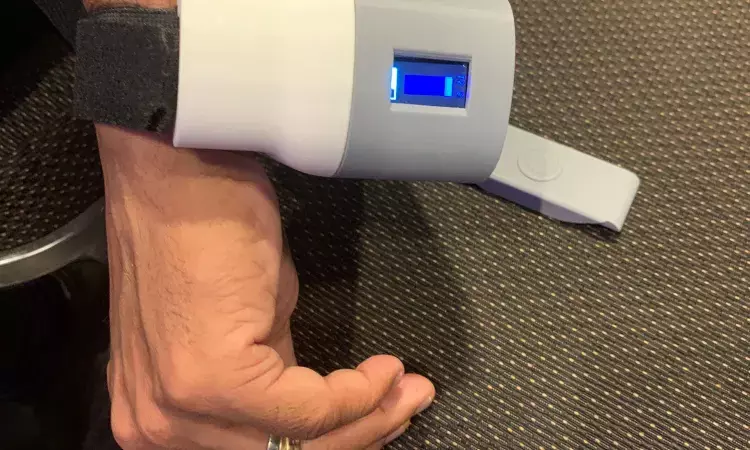- Home
- Medical news & Guidelines
- Anesthesiology
- Cardiology and CTVS
- Critical Care
- Dentistry
- Dermatology
- Diabetes and Endocrinology
- ENT
- Gastroenterology
- Medicine
- Nephrology
- Neurology
- Obstretics-Gynaecology
- Oncology
- Ophthalmology
- Orthopaedics
- Pediatrics-Neonatology
- Psychiatry
- Pulmonology
- Radiology
- Surgery
- Urology
- Laboratory Medicine
- Diet
- Nursing
- Paramedical
- Physiotherapy
- Health news
- Fact Check
- Bone Health Fact Check
- Brain Health Fact Check
- Cancer Related Fact Check
- Child Care Fact Check
- Dental and oral health fact check
- Diabetes and metabolic health fact check
- Diet and Nutrition Fact Check
- Eye and ENT Care Fact Check
- Fitness fact check
- Gut health fact check
- Heart health fact check
- Kidney health fact check
- Medical education fact check
- Men's health fact check
- Respiratory fact check
- Skin and hair care fact check
- Vaccine and Immunization fact check
- Women's health fact check
- AYUSH
- State News
- Andaman and Nicobar Islands
- Andhra Pradesh
- Arunachal Pradesh
- Assam
- Bihar
- Chandigarh
- Chattisgarh
- Dadra and Nagar Haveli
- Daman and Diu
- Delhi
- Goa
- Gujarat
- Haryana
- Himachal Pradesh
- Jammu & Kashmir
- Jharkhand
- Karnataka
- Kerala
- Ladakh
- Lakshadweep
- Madhya Pradesh
- Maharashtra
- Manipur
- Meghalaya
- Mizoram
- Nagaland
- Odisha
- Puducherry
- Punjab
- Rajasthan
- Sikkim
- Tamil Nadu
- Telangana
- Tripura
- Uttar Pradesh
- Uttrakhand
- West Bengal
- Medical Education
- Industry
Wrist-worn transdermal sensor for troponin measurement can help early diagnosis of heart attacks

USA: A new study published in European Heart Journal - Digital Health has claimed that using a wrist-worn transdermal sensor for measuring cardiac troponin may play a role in diagnosing acute myocardial infarction (MI). It increases the capability for early diagnosis of heart attacks in both community settings and acute care environments.
The device used infrared light to detect the concentration and presence of cardiac troponin-I in the blood through the skin and predicted the levels with 90% accuracy within 5 minutes. The study's findings were presented at the ACC (American College of Cardiology) Scientific Session/World Congress of Cardiology (WCC) 2023 by Partho P. Sengupta, a cardiology professor at Rutgers Robert Wood Johnson Medical School in New Brunswick, New Jersey.
"There's still a lot of work to be done, but this approach could potentially address prioritization and access issues, for example, by shortening the time to triage or being used by emergency responders to plan the patient's journey before they arrived at the hospital," Dr Sengupta said in his presentation.
Clinical differentiation of acute MI from unstable angina and other presentations mimicking ACS (acute coronary syndromes) is critical for implementing time-sensitive interventions and optimizing outcomes. However, the diagnostic steps depend on laboratory turnaround times, and blood draws.
Dr Sengupta and colleagues assessed the performance of a machine learning algorithm for identifying elevated high-sensitivity cardiac troponin-I (hs-cTnI) levels in patients hospitalized with ACS.
For this purpose, the researchers enrolled 238 patients hospitalized with ACS at five sites. The final MI diagnosis (with or without ST elevation) and unstable angina were adjudicated using ECG (electrocardiography), cardiac troponin test, echocardiography, or coronary angiography. A transdermal-ISS–derived deep learning model was trained and validated externally with hs-cTnI (one site) and echocardiography and angiography (two sites), respectively.
The study revealed the following findings:
- The transdermal-ISS model predicted elevated hs-cTnI levels with areas under the receiver operator characteristics of 0.90 [sensitivity, 0.86; and specificity, 0.82] and 0.92 (sensitivity, 0.94; and specificity, 0.64) for internal and external validation cohorts, respectively.
- In addition, the model predictions were associated with regional wall motion abnormalities [odds ratio (OR), 3.37] and significant coronary stenosis (OR, 4.69).
To conclude, a transdermal ISS for rapid bloodless estimation of hs-cTnI levels is feasible in real-world settings and may help establish a point-of-care (POC) biomarker diagnosis of acute myocardial infarction in patients with acute coronary syndrome.
"Future larger studies and pragmatic clinical trials would require to investigate the impact of transdermal-ISS on early, pre-hospital infarct diagnosis, triage, and therapy in emergency settings, including its use in chest pain clinics, emergency rooms, and implementation in ambulances and its utilization by trained paramedics," the researchers wrote.
The study, however, was preliminary that involved a relatively small number of patients, and additional refinements of the technology would be required.
Reference:
Shantanu Sengupta, Siddharth Biswal, Jitto Titus, Atandra Burman, Keshav Reddy, Mahesh C Fulwani, Aziz Khan, Niteen Deshpande, Smit Shrivastava, Naveena Yanamala, Partho P Sengupta, A novel breakthrough in wrist-worn transdermal troponin-I-sensor assessment for acute myocardial infarction, European Heart Journal - Digital Health, 2023;, ztad015,https://doi.org/10.1093/ehjdh/ztad015
Dr Kamal Kant Kohli-MBBS, DTCD- a chest specialist with more than 30 years of practice and a flair for writing clinical articles, Dr Kamal Kant Kohli joined Medical Dialogues as a Chief Editor of Medical News. Besides writing articles, as an editor, he proofreads and verifies all the medical content published on Medical Dialogues including those coming from journals, studies,medical conferences,guidelines etc. Email: drkohli@medicaldialogues.in. Contact no. 011-43720751


